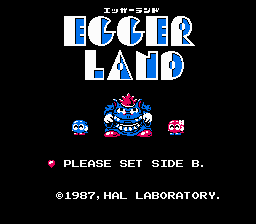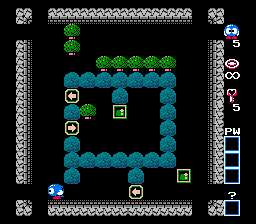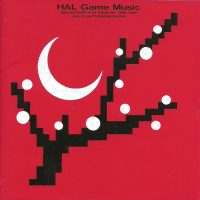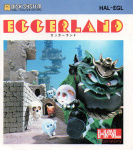Eggerland (FDS)
| Eggerland | ||||||
 |
||||||
| ||||||
- For other games in the series, see Adventures of Lolo.
Eggerland is an action-puzzler developed an published by HAL Laboratory. The player takes the role of the protagonist Lolo, who must save Princess Lala from the evil clutches of King Egger. To do this, he must traverse through 100 stages avoiding King Egger's enemies.
The goal of the game is to collect all the hearts on each level. When all the hearts are collected, a treasure box in the level opens up, and you must grab the key. Getting the key not only grants access to the next level, but also clears the stage of enemies. Sometimes, the hearts will give Lolo a powerup to transform some of the enemies into eggs. Hitting them a second time will temporarily despawn them off-screen. Turning the enemies into eggs allows Lolo to move them out of the way to reach certain areas. However, sometimes, the enemies are only meant to be pushed around, so Lolo must be careful. Lolo can also push enemies turned into eggs into the water to reach areas across the water. The game starts off with Snakeys, which cannot harm Lolo, and only act as a deterrent from reaching certain areas. In later levels, enemies such as the Medusas, Don Medusas, and Gols will fire projectiles at Lolo if he is in their line of sight. The Medusas are especially deadly, as getting in their line of sight is an instant death. Don Medusas also have the same effect, but they move either horizontally or vertically. The way to deal with both Medusas is to box them in with the chests found throughout the stages. Boxing them in or blocking their line of sight allows Lolo to pass through safely. Rockys cannot kill Lolo, but if he is in their line of sight, they will box him in, disabling him from moving, and forcing the player to press Select to die and retry. Leepers also have a similar effect, but chase Lolo around until they touch them, then they fall asleep permanently. The Skulls and Almas simply chase after Lolo and kill him upon contact.
Lolo can also collect certain powerups that can be used once in a level. For example, the hammer can break obstacles, the ladder can allow Lolo to cross water, and the arrows allow Lolo to change the one-way blocks to another direction to pass through.
Screenshots
Music
Eggerland has wonderful music. Many of the songs heard in this game were used in later games in the series. The music has a rich palette of styles, but consists of mostly jazz-oriented themes in a major key, adding to the game's charm. Some of the themes are dark, depressing, and ominous, especially the music that plays in the final area. There are also some Latin-based elements to some of the songs as well, such as the title and staff themes. Though there were two previous Eggerland games in the series for the MSX, they both had their own original music. The exception is this game's staff roll music, which is used in the ending of Eggerland Mystery 2 (MSX2).
The music was written by HAL's lead composer at the time, Hideki Kanazashi. According to the game's credits, specifically under the Tools credit, he used Music Maker. Other games give credit to this software as well.
Stage Theme 1 later served as the theme of Adventures of Lolo 2 (NES) (transposed from F to G), and the Staff Roll tune plays during the ending of Adventures of Lolo (NES).
The HAL Game Music CD lists the official names for most of the songs. However, the lose and win themes for the final boss count as part of the Daiou no Taiketsu portion of the track.
Recording
| # | Title | Composer | Length | Listen | Download |
|---|---|---|---|---|---|
| 01 | Opening | Hideki Kanazashi | 0:26 | Download | |
| 02 | Tabidachi | Hideki Kanazashi | 0:36 | Download | |
| 03 | Hi no Michi | Hideki Kanazashi | 0:33 | Download | |
| 04 | Midori no Michi | Hideki Kanazashi | 0:40 | Download | |
| 05 | Kami no Keiji | Hideki Kanazashi | 0:55 | Download | |
| 06 | Ankoku Sekai | Hideki Kanazashi | 0:49 | Download | |
| 07 | Umi no Michi | Hideki Kanazashi | 0:40 | Download | |
| 08 | Jigoku | Hideki Kanazashi | 0:36 | Download | |
| 09 | Chousen | Hideki Kanazashi | 0:53 | Download | |
| 10 | Daiou no Taiketsu | Hideki Kanazashi | 0:18 | Download | |
| 11 | Daiou no Taiketsu ~ End of Round | Hideki Kanazashi | 0:02 | Download | |
| 12 | Daiou no Taiketsu ~ Win | Hideki Kanazashi | 0:04 | Download | |
| 13 | Daiou no Taiketsu ~ Lose | Hideki Kanazashi | 0:07 | Download | |
| 14 | Gyakushuu | Hideki Kanazashi | 0:18 | Download | |
| 15 | Lala tono Saikai | Hideki Kanazashi | 0:06 | Download | |
| 16 | Ending | Hideki Kanazashi | 2:01 | Download |
Credits
- Ripper: MrNorbert1994
- Recorder: Doommaster1994
- Game Credits:
- Sound Composer: Hideki Kanazashi credited as Zap Ajisai
(Source)
The game's credits are displayed after the ending. Hideki uses an alias, but the album HAL Game Music identifies Kanazashi as the composer behind Eggerland. Not only does the music share the same style as his other works, but other games in the series credit him under more obvious pseudonyms, such as Nige no Kanazashi in Eggerland: Meikyuu no Fukkatsu (FC).
Albums
|
Game Rip
Releases
| ||||||||||||
Links
- gamefaqs.gamespot.com/famicomds/578372-eggerland - GameFAQs.
- mobygames.com/game/nes/eggerland - MobyGames.








